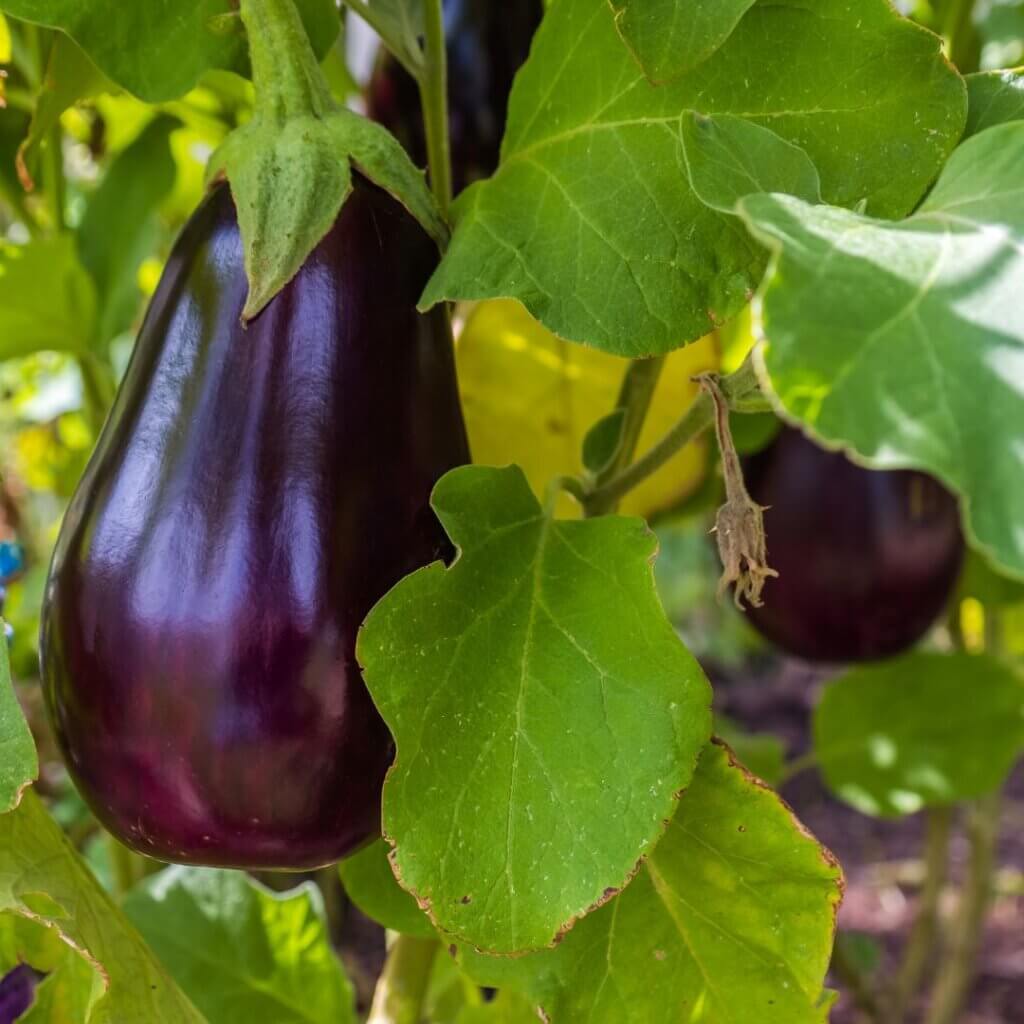Growing eggplants from seeds in your home garden is a rewarding experience. These glossy fruits, known for their vibrant colors and delicious taste, thrive in sunny and well-prepared environments. This guide will walk you through everything you need to know about how to grow eggplants from seeds.
Why Grow Eggplants at Home?
- Fresh and Organic Produce: Homegrown eggplants ensure you enjoy fresh, chemical-free fruits straight from your garden.
- Versatile Culinary Uses: Eggplants are a staple in many cuisines, perfect for grilling, baking, and stewing.
- Aesthetic Appeal: Their glossy, colorful fruits and bushy green plants add beauty to any garden.
- Cost-Effective Gardening: Growing your own eggplants saves money compared to buying them at the store.
- Sustainable Living: Cultivating eggplants at home reduces your environmental impact and promotes a greener lifestyle.
Selecting the Right Eggplant Variety
Choosing the right variety is crucial for success. In South Africa, popular eggplant varieties include:
- Black Beauty: A classic variety with large, glossy purple fruits.
- Long Purple: Known for its elongated fruit shape, perfect for stir-fries.
- Thai Purple: Smaller, sweeter fruits ideal for Asian dishes.
- White Eggplant: Striking white fruits with a mild flavor, adding a decorative touch to your garden.
For a diverse range of seeds, explore Living Seeds’ Eggplant Collection or Glen Seeds’ Eggplant Options.
Preparing to Plant Eggplants from Seeds
Choosing the Right Spot
- Sunlight: Eggplants thrive in full sun—ensure your garden gets 6-8 hours of sunlight daily.
- Soil Quality: Prepare well-draining soil enriched with compost or aged manure for optimum growth.
- Temperature: Eggplants prefer warm soil, making them ideal for South Africa’s summer growing season.
- Wind Protection: Protect plants from strong winds by planting near windbreaks or fencing.
- Water Access: Ensure easy access to water for regular irrigation.
Learn more about soil preparation at Seeds and Plants’ Eggplant Growing Guide.

Planting Eggplants from Seeds
Starting Seeds Indoors
Eggplants grow best when started indoors:
- Timing: Start seeds 8-10 weeks before transplanting them outdoors.
- Containers: Use seed trays with a light, well-aerated potting mix.
- Planting Depth: Sow seeds about 0.5-1 cm deep and cover lightly with soil.
- Watering: Mist regularly to maintain moisture without waterlogging.
- Light: Place trays in a sunny window or under grow lights for 12-16 hours daily.
For in-depth seed-starting techniques, visit PlantInfo’s Eggplant Guide.
Transplanting Eggplants
Transplanting eggplants is a crucial step to ensure they thrive in your garden. Here’s a detailed guide to help you transition your seedlings successfully:
1. Hardening Off Seedlings
Hardening off is essential to prepare seedlings for outdoor conditions. Follow these steps:
Start Gradually:
- On day one, place seedlings outdoors in a shaded spot for 2-3 hours.
- Keep them protected from direct sunlight and strong winds.
Increase Sunlight Exposure:
- Over the next 7-10 days, gradually increase their exposure to sunlight by an additional hour each day.
- By the end of the hardening-off period, the seedlings should handle full sun for most of the day.
Reduce Watering Slightly:
- During this process, reduce watering just enough to encourage root development without drying out the soil.
Monitor Weather:
- Avoid exposing seedlings to extreme conditions like heavy rain or strong winds during hardening off.
Final Day Prep:
- On the last day, leave seedlings outside overnight in a sheltered location to acclimate them to cooler temperatures.
2. Garden Transplanting
Once seedlings are hardened off, it’s time to transplant them into your garden. Follow these steps:
Timing:
- Transplant seedlings when they are 10-15 cm tall and have at least 4-6 true leaves.
- Ensure outdoor temperatures are consistently warm and frost-free.
Prepare the Planting Area:
- Loosen the soil in the planting bed to improve aeration and root penetration.
- Enrich the soil with compost or aged manure for added nutrients.
Spacing:
- Space plants 45-60 cm apart in rows that are 60-90 cm apart.
- Proper spacing ensures good airflow, which helps prevent diseases and supports healthy growth.
Planting Depth:
- Dig a hole large enough to fit the seedling’s root ball.
- Place the seedling in the hole at the same depth it was growing in its tray or pot to prevent stem rot.
- Gently firm the soil around the roots to eliminate air pockets.
Watering:
- Water each seedling thoroughly immediately after planting to help settle the soil and reduce transplant shock.
- Ensure the water reaches the root zone without creating puddles.
Mulching:
- Apply a 5-10 cm layer of organic mulch (like straw, bark, or grass clippings) around each plant.
- Keep the mulch slightly away from the stem to prevent rot while retaining moisture and suppressing weeds.
Tips for Success:
- Support Early Growth: Use stakes or small cages if your area is prone to strong winds or if your eggplant variety produces heavy fruits.
- Pest Protection: Check for cutworms or other pests after transplanting and use collars or organic pest deterrents if necessary.
- Check Moisture Levels: Keep the soil evenly moist but avoid overwatering to prevent root rot.

Caring for Eggplants
Watering
- Deep Watering: Water at the base of plants to encourage strong roots.
- Frequency: Water deeply 1-2 times a week, adjusting for weather conditions.
- Morning Routine: Water early to allow foliage to dry during the day.
- Mulching: Mulch around plants to conserve moisture and reduce evaporation.
- Avoid Overwatering: Too much water can lead to root rot and fungal diseases.
Fertilizing
- Pre-Planting: Incorporate compost or a balanced fertilizer into the soil before planting.
- Ongoing Nutrition: Side-dress plants with organic compost or a balanced fertilizer every 2-3 weeks.
- Boost Potassium: During fruiting, increase potassium levels to enhance fruit quality.
- Avoid Over-Fertilization: Excessive nutrients can lead to lush foliage but fewer fruits.
- Soil Testing: Test soil periodically to adjust fertilization needs accordingly.
Pests and Diseases
Eggplants in South Africa are prone to pests like:
- Red Spider Mites: Control infestations with neem oil or insecticidal soap.
- Aphids: Encourage beneficial insects like ladybirds to manage aphids naturally.
- Cutworms: Use physical barriers like collars to protect young plants.
For detailed pest management tips, visit Seeds and Plants’ Growing Guide.
Harvesting Eggplants
- Check Ripeness: Harvest when the skin is glossy, firm, and vibrant.
- Cut Carefully: Use scissors or pruners to cut fruit, leaving a small portion of the stem attached.
- Harvest Regularly: Picking fruits frequently encourages more production.
- Avoid Overripening: Overripe eggplants can turn bitter.
- Store Properly: Keep harvested fruits in a cool, dry place to prolong freshness.
Final Thoughts on How to Grow Eggplants from Seeds
Growing eggplants from seeds is a fulfilling gardening experience, especially in South Africa’s ideal conditions. By combining these expert tips and the resources provided, you’ll enjoy a lush, productive garden filled with fresh, flavorful eggplants.
Explore more resources:
- Living Seeds’ Eggplants
- Glen Seeds Eggplant Guide
- PlantInfo’s Eggplant Guide
- Seeds and Plants’ Growing Guide
Got a question? Share it in the comments below!
Common Questions and Answers About How to Grow Eggplants from Seeds
How long does it take to grow eggplant from seed?
Eggplants take approximately 100 to 120 days from seed to harvest, depending on the variety and growing conditions. Germination typically occurs within 7 to 14 days, after which the seedlings will develop steadily if provided with warm temperatures and adequate care.
Do I need to soak eggplant seeds before planting?
Soaking eggplant seeds before planting is not necessary but can speed up germination. If you choose to soak them, leave them in warm water for 12 to 24 hours. This helps soften the seed coat, allowing moisture to penetrate more easily.
Can you plant eggplant seeds directly in the ground?
Yes, you can plant eggplant seeds directly in the ground, but this is less common due to the plant’s preference for warm soil. For the best results, start seeds indoors 8 to 10 weeks before the last frost and transplant them once the soil temperature is consistently above 20°C.
What is the best month to plant eggplant?
The best time to plant eggplants in South Africa is from August to November in warmer regions or after the risk of frost has passed in cooler areas. This ensures the plants have the warm weather they need to thrive.
What is the secret for growing eggplant?
The secret to growing healthy eggplants lies in providing plenty of warmth, sunlight, and rich, well-draining soil. Regular feeding with a balanced fertilizer and consistent watering will also promote vigorous growth and high yields.
Do eggplants need a lot of water?
Eggplants require moderate watering to keep the soil evenly moist but not waterlogged. Water deeply once or twice a week, depending on weather conditions, to ensure the roots receive adequate hydration.
Do eggplant plants like sun or shade?
Eggplants thrive in full sun and need at least 6 to 8 hours of direct sunlight daily. Insufficient sunlight can lead to slower growth and reduced fruit production.
What is the best fertilizer for eggplants?
Eggplants benefit from a balanced fertilizer with equal amounts of nitrogen, phosphorus, and potassium. During flowering and fruiting, switch to a fertilizer higher in potassium and phosphorus to support fruit development.
Do eggplants like Epsom salt?
Epsom salt, which contains magnesium, can be beneficial for eggplants if the soil is deficient in magnesium. Use it sparingly as a foliar spray or soil amendment, as too much can harm the plants.
Should I pinch off eggplant leaves?
Pruning eggplant leaves is not necessary but can improve airflow and reduce the risk of disease. Remove any yellowing, damaged, or crowded leaves to promote healthy growth and better light penetration.
Where do eggplants grow best?
Eggplants grow best in warm, sunny locations with rich, well-draining soil. Raised beds or containers are also good options, as they provide better drainage and allow for temperature control in cooler regions.


